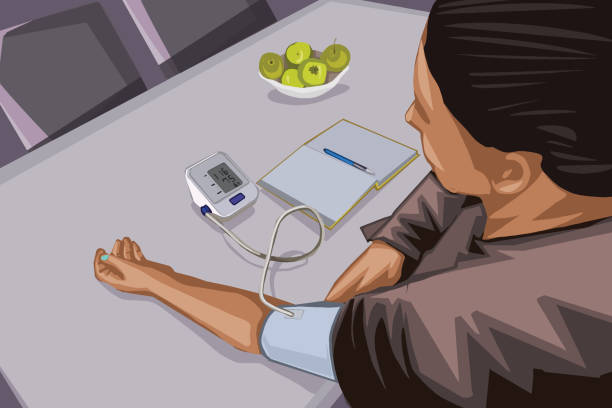Health Conditions
The Shocking Long-Term Effects of High Blood Pressure
High blood pressure, also known as hypertension, affects millions of people worldwide. While it’s often referred to as the silent killer due to the lack of symptoms of high blood pressure, the long-term effects on the body should not be underestimated. From damage to the heart, arteries, and other vital organs, high blood pressure can dramatically increase the risk of serious health conditions such as heart disease, stroke, and kidney failure.
Additionally, it can lead to vision problems, cognitive decline, and even contribute to the development of dementia. Understanding the shocking long-term effects of high blood pressure is essential for taking steps to manage and control this silent threat to our health and wellbeing. Stay tuned as we explore the alarming consequences of living with untreated high blood pressure.
Understanding High Blood Pressure
Defining Hypertension
High blood pressure, often known as hypertension, is a prevalent disorder affecting a large number of people worldwide. Hypertension is described as having a regularly increased blood pressure level of 130/80 mm Hg or greater. Blood pressure is measured in millimeters of mercury (mm Hg) and reported as two numbers: systolic and diastolic. The top number, systolic pressure, measures the pressure in the arteries while the heart beats. The diastolic pressure is the lowest figure, indicating the pressure in the arteries while the heart is at rest between beats.
Measuring Blood Pressure
Blood pressure is measured with a blood pressure cuff and stethoscope or an automatic blood pressure monitor. Blood pressure should be measured on a regular basis to detect any changes. Normal blood pressure is less than 120/80 mm Hg. Blood pressure levels between 120/80 and 129/80 mm Hg are considered high.
Causes and Risk Factors
High blood pressure can be caused by a variety of variables, including age, family history, obesity, smoking, a lack of physical activity, and a salty and saturated fat-rich diet. Diabetes, renal illness, and sleep apnea can all raise your chance of getting high blood pressure.
According to the American Heart Association, hypertension is a leading cause of heart disease, stroke, and other health problems. If left untreated, high blood pressure can cause major problems such as heart attack, stroke, kidney failure, and visual loss.
To summarize, hypertension is a widespread disorder that affects a large number of people globally. Regular blood pressure monitoring, as well as lifestyle adjustments, can assist to avoid and control high blood pressure. Understanding the causes and risk factors of hypertension is critical for lowering your chance of developing major health problems.

Long-Term Effects of High Blood Pressure
High blood pressure, often known as hypertension, can have serious long-term health effects. These implications might be severe, affecting various organs and systems in the body.
Cardiovascular Complications
High blood pressure can damage blood vessels, increasing the risk of cardiovascular illnesses such as heart attack, stroke, and heart failure. Increased strain on blood arteries can lead them to constrict and stiffen, reducing blood flow to the heart and other organs. This can cause chest pain, shortness of breath, and other symptoms.
Kidney-Related Issues
High blood pressure can also harm the kidneys, resulting in renal disease and, eventually, kidney failure. The kidneys filter waste items from the blood, and high blood pressure can damage the small blood capillaries of the kidneys, limiting their ability to function effectively.
Effects on the Brain and Cognitive Function
High blood pressure can also have an effect on cognitive performance. It can raise the risk of dementia and vascular dementia, which is caused by a decrease in blood supply to the brain. High blood pressure can also increase the risk of aneurysms, which are bulges in blood vessels that can burst and cause brain bleeding.
Overall, it is critical to treat high blood pressure to avoid these long-term health effects. This can be accomplished by making lifestyle changes such as eating a good diet, exercising regularly, and managing stress, as well as taking medication as needed. Regular check-ups with a healthcare practitioner can also assist in monitoring blood pressure and identifying potential problems early on.

Management and Treatment of High Blood Pressure
Lifestyle Modifications
Changing your lifestyle is one of the most effective methods to treat high blood pressure. These adjustments can help lower blood pressure and lessen the likelihood of long-term effects. Some of the lifestyle changes that can be implemented are:
- Changing your diet to include more potassium and less salt can lower blood pressure. A diet high in fruits, vegetables, whole grains, and lean protein can also help control blood pressure.
- Regular exercise helps reduce blood pressure and enhance general health. Aim for at least 30 minutes of moderate-intensity exercise on most days of the week.
- Stress can lead to high blood pressure. Deep breathing, meditation, and yoga are all effective ways to reduce stress and blood pressure.
- Avoiding smoking: It can raise blood pressure and lead to long-term issues. Quitting smoking can lower blood pressure and improve general health.
Medication and Medical Interventions
In some circumstances, lifestyle changes may not be sufficient to control high blood pressure. In some circumstances, medication and medical intervention may be required. Some of the drugs that can be prescribed are:
Diuretics reduce blood pressure by helping the body eliminate excess fluid and salt.
Calcium channel blockers relax blood arteries, lowering blood pressure.
It is critical to consult with a healthcare professional to identify the optimal treatment plan for high blood pressure. Healthy lifestyle practices, combined with medication and medical interventions, can help manage high blood pressure and enhance overall quality of life.

Monitoring and Long-Term Considerations
Regular Screening and Check-ups
Adult blood pressure levels must be monitored on a regular basis through checkups and tests. The American College of Cardiology (ACC) recommends that all individuals get their blood pressure measured at least every two years, and more regularly if they have metabolic syndrome, high blood sugar or triglycerides, or a family history of hypertension.
Screening and diagnosis can help detect hypertension early, allowing for rapid treatment and management. It is vital to highlight that hypertension frequently causes no symptoms, hence regular screening is essential for early detection.
Living with Hypertension
Hypertension is a chronic illness that requires ongoing treatment. Medicines, lifestyle changes, and regular check-ups are all essential for controlling blood pressure and lowering the risk of problems.
ACE inhibitors, diuretics, and calcium channel blockers are popular treatments for hypertension. It is critical to take medications exactly as recommended and to tell a healthcare provider if you experience any adverse effects or concerns.
Aside from drugs, lifestyle adjustments can help regulate blood pressure. Reducing alcohol intake, stopping smoking, keeping a healthy weight, and engaging in regular exercise can all help to decrease blood pressure and enhance quality of life.
Left ventricular hypertrophy (LVH) and blood clots are two possible long-term consequences of hypertension. Regular check-ups and screenings can help monitor these issues and provide timely treatment if necessary.
Erectile dysfunction is also a possible side effect of hypertension. Managing blood pressure and living a healthy lifestyle can assist in lowering the risk of erectile dysfunction.
Overall, regular screening, quick treatment, and long-term management are critical for controlling hypertension and lowering the risk of consequences.
Conclusion
Finally, the long-term effects of high blood pressure highlight the crucial significance of proactive management and prevention methods to reduce its terrible health consequences. Untreated hypertension has far-reaching and devastating effects, including cardiovascular disease, organ damage, and reduced cognitive function. Individuals can successfully manage their blood pressure and reduce the risk of associated consequences by raising awareness, promoting frequent blood pressure monitoring, adopting healthy lifestyle practices, and sticking to prescribed medication regimens.
Furthermore, targeting population-wide treatments such as public health campaigns, legislation that promote healthier surroundings, and equal access to healthcare is critical for tackling the larger socioeconomic impact of high blood pressure. We can work together to create healthier communities and improve everyone’s quality of life by treating hypertension.
Trusted Health, Wellness, and Medical advice for your well-being


